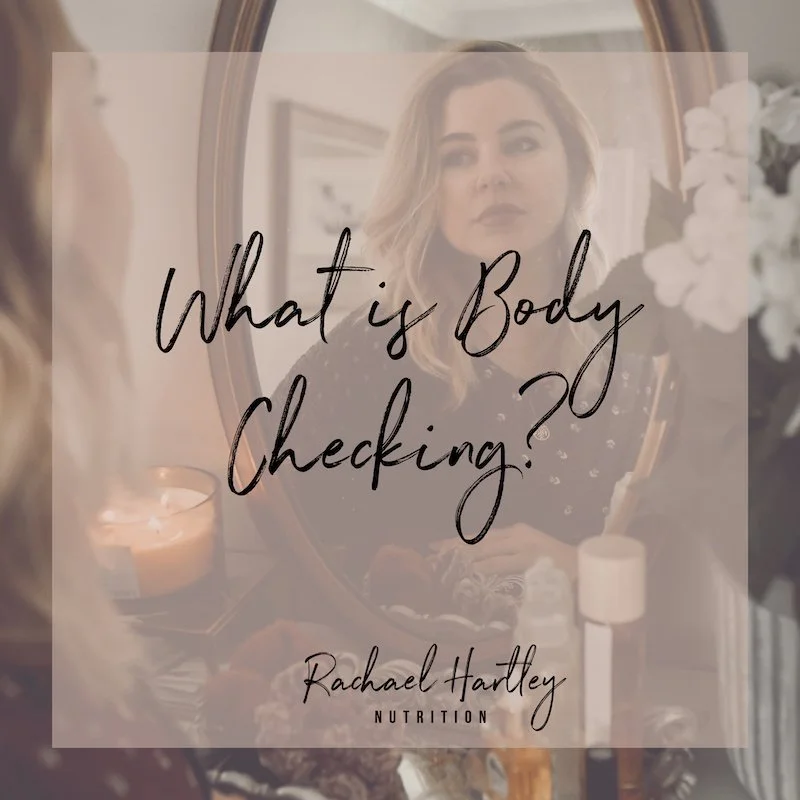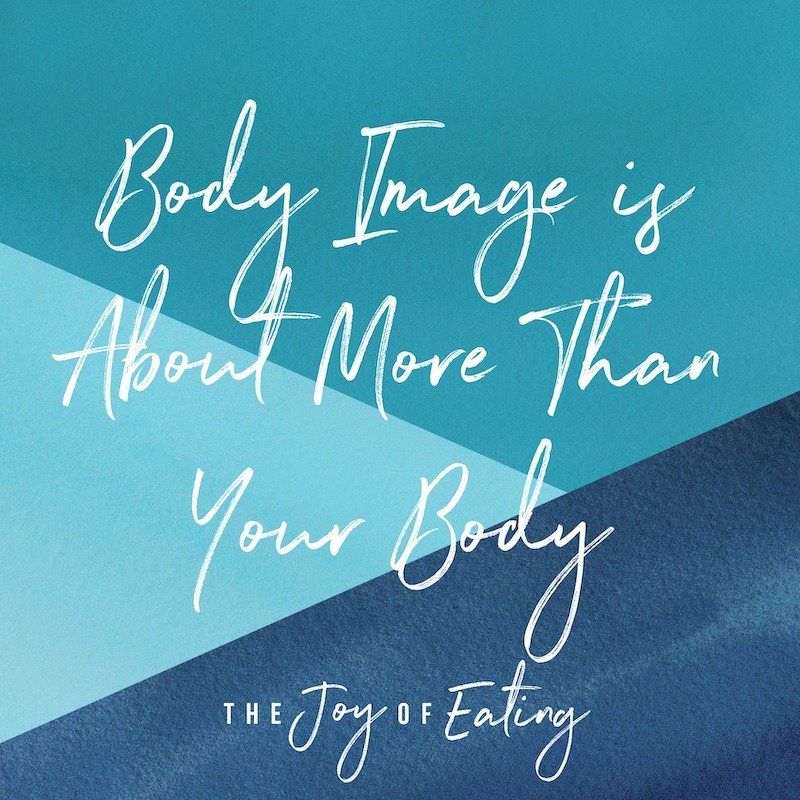What is Body Checking?
Body image feeling kind of ick? Body checking is a common behavior that people engage in, especially when they struggle with an eating disorder or disordered eating, and it can fuel negative body image. Read this post to learn what body checking is, and how you can stop it.
This blog post was written by my lovely intern from Simmons University, Lindsay Hodgson. Thanks Lindsay for contributing your knowledge and time to creating this resource!
With summer on the horizon, you might have noticed that you’re spending more time thinking about your body and weight. I don’t know about you, but I’ve noticed my instagram feed is getting a bit clogged with targeted ads for bathing suits modeled by thin models! We’re surrounded by messaging telling us we need to be “bikini body” ready, so it’s hard not to feel more critical of your body this time of year. With that, you might have noticed an increase in a behavior called body checking.
What is body checking?
Body checking, as it sounds, is the process of checking your body through actions, thoughts, or conversations. Often it is a way of assessing where your body is now in relation to a standard you have in your mind of where it “should” be. The tough thing about body checking is that it is so normalized in diet culture and the appearance-obsessed society we live in. We all do it, intentionally or unintentionally, as body checking is part of navigating the world in your body and being in relationship with it.
It can be helpful to learn about body checking because it can profoundly impact your body image and relationship to your body. For many people, body checking may be a behavior that feels like it is on autopilot. As you become more conscious of body checking, you can make more deliberate choices of how you want to respond. With time, it may become less of a factor in negative body image.
What are body checking behaviors?
Body checking manifests differently among us all. Common body checking behaviors, intentional or unconscious, are:1,2
Weighing yourself. For example, stepping on a bathroom scale each morning or having a routine of tracking your weight when medically unnecessary.
Looking at specific body parts in the mirror.
Checking the fit of clothes. This can show up especially after putting on a garment that was recently in the dryer or something you haven’t worn in a while, where you might experience anxiety of “is this tighter than it was before?”
Asking for reassurance related to your shape or size, such as “is this flattering?”
Comparing your shape or size to other people. Often this occurs in internal dialogue, where you might walk into the room and try to assess your size against others.
Another common form of body checking that many of us experience in our daily lives since the pandemic is looking at your own video square while on a video call. In fact, seeing your reflection is one of the contributing factors of “Zoom fatigue.” In a Stanford article, the authors named how taxing and stressful it can be to constantly see your reflection, and how it may lead to more self-criticism.
Why do you body check?
The root cause of someone’s body checking is not simply aesthetics. It can be for many reasons from external to emotional factors. Regardless of someone’s unique experience, we cannot ignore systemic and internalized fatphobia as playing a huge role. Simply put, if we didn’t live in a fatphobic world, we wouldn’t body check, just as we don’t compulsively check the color of our hair or our height.
With that in mind, here are a few other reasons:
Control. People may body check to maintain control and discipline over their bodies.
Relief or reassurance. Others body check for proof that their body hasn’t changed (meaning check that it has not gotten bigger) or to see if they are seeing results with weight loss, body sculpting, etc.
Obligation. Many people have been told to lose weight by medical providers, and so they body check to comply with recommendations and out of concern for their health.
How does body checking relate to body image and eating disorders?
If you've found yourself feeling icky in your body after stepping on the scale or passing a reflection, you’re not alone. In fact, there is data to prove it. While all body checking is not inherently disordered, research has demonstrated a link between body checking and eating disorder pathology.1 Several studies support the idea that body checking behaviors may perpetuate the development of an eating disorder and body image dissatisfaction.1 One particular study noted an increase in negative emotions among participants after body checking compared to beforehand.2 This difference was even greater in participants with diagnosed eating disorders versus participants without eating disorders.2
In this way, it is a cyclical relationship where body checking behaviors may be both symptoms and contributing factors to the progression of an eating disorder. For many people body checking behaviors become ways of feeling safe and in control while active in their eating disorder. Yet it usually makes things worse. this Negative body image via body checking may then encourage dieting, restriction, or other disordered behaviors to “make up” for perceived problems or gain control over one’s body shape or size.”2
This is common among clients’ lived experiences at any stage in recovery. Body checking can be a trigger even when someone has made tremendous progress to heal their relationship with food and body. It is normal for someone to face a setback of restricting or over-exercising again after stepping on the scale at the doctor’s office or seeing a picture of themselves they dislike.
How can I reduce body checking?
Journal without judgment to explore why you body check. When did you learn to body check? What are you checking for? In that behavior what else are you searching for? When are you likely to body check? How does body checking serve your body image? How does it harm your body image?
Notice when you body check. Name what is happening. Bring some gentle mindfulness to the moment. Do a quick body scan. Notice how you feel in your body.
When you have more awareness of the factors to lead you to body check, consider small modifications that might reduce or eliminate the body checking behavior. This might look like avoiding the jeans that pinch your waist, hiding the self-view on Zoom, moving your mirror to another location in your home, putting your scale in a cupboard for the time being, and more. Small adjustments to the objects and routines that remind you to body check can help you decrease body checking behaviors and be less fixated on negative body image thoughts.
Sources:
Walker DC, White EK, Srinivasan VJ. A meta-analysis of the relationships between body checking, body image avoidance, body image dissatisfaction, mood, and disordered eating. Int J Eat Disord. 2018 Aug;51(8):745-770. doi: 10.1002/eat.22867.
Kraus N, Lindenberg J, Zeeck A, Kosfelder J, Vocks S. Immediate Effects of Body Checking Behavior on Negative and Positive Emotions in Women with Eating Disorders: An Ecological Momentary Assessment Approach. Eur Eat Disord Rev. 2015 Sep;23(5):399-407. doi: 10.1002/erv.2380.
If this blog post on body checking was helpful and you feel like you would benefit from more individualized body image support, check out our practice philosophy and nutrition coaching services page. We work with clients virtually throughout the US.





